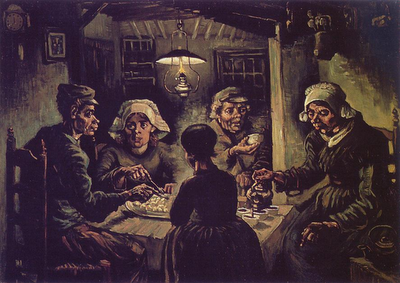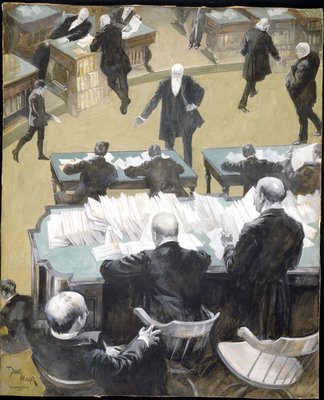The more t stays the same.
[I published this in November, 2006. And now, almost 18 years later, what has changed? It's gotten worse. That's what!]
Two recent articles on the CBC News website caught my attention, simply for the absurdity of placement.
More working poor using food banks: study
November 28, 2006 | 12:05 PM ET
CBC News
BMO sets profit record despite fourth-quarter weakness
Last Updated: Tuesday, November 28, 2006 | 12:01 PM ET
CBC News
I've posted the articles below, with pictures I've found. Exaggerations, maybe. Maybe not.
The Potato Eaters, 1885
by Vincent van Gogh (1853 - 1890)
by Vincent van Gogh (1853 - 1890)
More working poor using food banks: study
November 28, 2006 | 12:05 PM ET
CBC News
More people with jobs are relying on food banks despite an 8.5 per cent drop in overall use, says the Canadian Association of Food Banks.
According to the group's HungerCount 2006 report released on Tuesday, the percentage of food bank clients who are working is 13.4 per cent, up from 13.1 per cent last year.
The survey says the "working poor" continue to comprise the second largest group of food bank clients after social assistance recipients, who account for 53.5 per cent of clients across the country.
"People like you and I, people working, can't manage to feed their families," said CAFB executive director Charles Seiden.
"Low wages may be only one of several factors contributing to the working poor phenomenon in Canada. But the fact that real wages in the country have not improved over the last several years tells us that our leaders have neglected the country's labour rights and standards."
The study also showed children account for 41 per cent of the estimated 753,458 food bank clients, although they make up only about a quarter of the country's population.
Continue Article
Seiden said food bank use has risen 99 per cent since 1989, when the first food bank study was conducted.
Government must step in: Seiden
He called on the government develop policies to strengthen income and employment security and help Canadian families with housing and day care.
The CAFB represents food banks and food distribution centres across the country, serving 90 per cent of the people who use emergency food programs in Canada.
Other findings include:
* Highest provincial per capital food bank use: Newfoundland (5.6 per cent).
* Province assisting the largest share of food bank recipients: Ontario (330,491).
* Percentage of food banks with difficulty meeting demand:34.per cent.
* Years since the federal government promised to eliminate child poverty: 17.
~In Canada, a land of plenty, people can't feed, house or clothe their families. We have a large homeless population, not just junkies and binners who like the life, but poor people who cant' find that elusive thing called a home. Rather shameful. I blame Wal-Mart.
~~
The following painting depicts US senators deciding where all the money will be spent. I think it perfectly represents our banking hierarchy deciding how to milk more dollars from the customers. A pretty painting, but not a pretty picture.

Spending Uncle Sam's Money ca. 1899
by T. Dart Walker (1869 - 1914)
by T. Dart Walker (1869 - 1914)
BMO sets profit record despite fourth-quarter weakness
Last Updated: Tuesday, November 28, 2006 | 12:01 PM ET
CBC News
BMO Financial Group set several new records in 2006, as profits rose by 11 per cent to $2.66 billion or $5.15 a share, despite a weaker business environment in the fourth quarter.
The bank raised its quarterly dividend by three cents, or 33 per cent over the year, to 65 cents a share, giving a triumphal farewell for Tony Comper, who will retire in March after eight years as chief executive officer.
BMO three-month tradingBMO three-month trading
He will be replaced by Bill Downe, currently chief operating officer.
BMO, which trades as the Bank of Montreal, was the first of Canada's big-six chartered banks to reports its results for the 2006 fiscal year.
The 2006 fiscal year ended on Oct. 31.
Comper seemed pleased with the results, BMO's fourth consecutive year of record results.
Continue Article
"It was a good year overall," he announced Tuesday morning, noting that all three operating groups delivered a record net income for the second year in a row, while the bank met or exceeded four of its five performance targets for the year.
The bank missed one of its key targets, improvements in cash productivity, because of its continued investment in retail businesses and a change in the business mix.
The bank set the records despite a difficult operating environment. But Comper said "favourable income taxes" and low credit losses in the fourth quarter helped the bank maintain a strong financial performance.
For the fourth quarter, the bank reported net income of $696 million, up $32 million or 4.8 per cent, with a return on equity of 19.4 per cent, down from 20.0 per cent. Revenue declined by 5.9 per cent, and expenses by 0.9 per cent.
The bank was hit hard in the U.S. market in the fourth quarter, where the income of the Personal and Commercial Banking division fell by $11 million to $23 million due to a weaker U.S. dollar, the cost of integrating acquisitions and expensive technology improvements in its branches.
Income of the bank's Private Client Group rose by 12 per cent to $12 million, excluding gains on asset sales in 2005, due to higher mutual fund fees and interest revenues.
The bank expects moderate growth in the Canadian economy in 2007. The Canadian housing market is expected to slow as past increases in interest rates dampen sales and construction. But business investment is expected to remain strong, due to continued healthy gains in corporate profits.
The U.S. economy is also expected to grow moderately in 2007, boosted by a drop in energy prices. Mortgage rates will keep a damper on the housing market, but business loans are expected to grow.
Shareholders seemed unimpressed with the results. Company shares fell by $1.22 to $70.29 on the Toronto Stock Exchange by late morning.
Related
Internal Links
TSX:BMO
BMO Q3 earnings up 30 per cent
~
I don't understand why shareholders seemed unimpressed. Can they be so blasé that million dollar record profits no longer excite them? Oh, I get it -- share prices fell.
Lest anyone think otherwise, I do believe in free enterprise. I also believe in compassion. Maybe you can't have both.
--Cat
